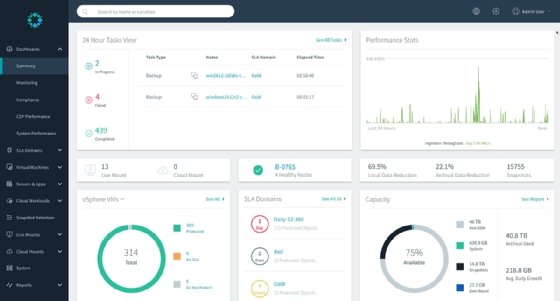
stefanovi - Fotolia
Rubrik's latest update goes faster, covers more clouds
Rubrik's update focuses on backup speed and cloud workload support, but the industry is trending away from traditional databases and toward cloud-hosted databases and containers.
Rubrik Andes 5.3 doesn't introduce anything groundbreaking, but it does bring significant speed and cloud support to the data protection and management platform.
Andes 5.3, the latest version of Rubrik's Cloud Data Management software, gained a large speed boost to its backup and recovery capabilities. Rubrik claimed it can perform SQL Server backups up to 10 times faster than in version 5.2 and doubled its Oracle backup speed. NAS restore speed has tripled with this update, and Rubrik claimed it can now scan 35 million NetApp files in less than 15 minutes. The update also added a couple of new data protection-related features, including recovery validation for Oracle databases to ensure recoverability and new SLA policies for Rubrik Elastic App Service and managed volumes for backup automation.
The second half of the Andes 5.3 package is expanded cloud support. Google Cloud support was added, including the ability for Rubrik to automatically detect and protect SAP HANA data on Google Cloud. Other added support included VMware Cloud on AWS, Oracle databases on AWS and Azure and an update to Polaris that enables cross-region recovery of Amazon RDS.
Rubrik Polaris is a SaaS platform for managing data in Rubrik appliances and in the cloud. It is a separate product from Rubrik's data protection software. Polaris' Sonar application, a compliance tool which detects personally identifiable information, will be gaining the ability to scan file access patterns and find potentially risky files that have been dormant.
Polaris Sonar's update is expected to be available in Q1 2021. Rubrik Andes 5.3 is currently in beta and is expected to launch sometime in December.

Rubrik's vice president of products Vasu Murthy said he saw examples of organizations modernizing their infrastructure before COVID-19, such as transitioning from on-premises Microsoft Exchange to Office 365 email. When the pandemic hit, more customers made this jump. Murthy also reported that the number of customers using Rubrik's cloud archival feature doubled in the last four months. He said since cloud is completely software-controlled through APIs, no one has to physically go anywhere, making it perfectly suited for a pandemic.
However, COVID-19 also carried a higher cyber-risk. Murthy said the ransomware threat persists and has become more frequent, citing a statistic from Bitdefender's "Mid-Year Threat Landscape Report 2020" stating a sevenfold increase in ransomware attacks in the first half of 2020. Customers are aware that their data in the cloud are at risk and demand protection, prompting Rubrik to add more support for cloud workloads.
"The ransomware guys are not sitting quiet," Murthy said.
Naveen Chhabra, senior analyst at Forrester Research, described Andes 5.3 as doing everything better and faster, without really shaking anything up. He found Rubrik's recovery validation tool for Oracle especially interesting, saying that knowing the viability of backups has been an, "unwritten, unasked need," from customers. Backing up and recovering faster are all well and good, but customers are equally interested in knowing the actual recoverability of the snapshots they are taking.
"Every day, you go through the motions, you do your backups. But can the vendor provide a view into how recoverable those are?" Chhabra said.
On the cloud adoption front, Chhabra said Forrester predicts that by 2021, 43% of all application spending will be in the public cloud. In his view, this translates to a future where nearly half of all support will be geared toward public cloud efforts such as SaaS offerings provided by a public cloud vendor or home-grown applications living in a public cloud. This leads him to conclude that, on the whole, the industry is trending away from traditional databases, and, by extension, the traditional methods of protecting them.
Chhabra said the cloud and database support in Andes 5.3 undoubtedly addresses the current demands of Rubrik's customers, but he doesn't see it as the overall demand of the market. In a conversation with Amazon representatives during AWS re:Invent 2019, Chhabra said he learned people were moving away from Oracle and adopting AWS Aurora. He believes organizations are trending toward cloud-hosted databases such as DynamoDB and graph databases used in social media and retail sites, and not toward cloud variants of traditional databases.
Chhabra added that containers and Kubernetes support is the current hot trend in data protection. The fact that independent Kubernetes protection and management vendors Kasten and Portworx were both bought by larger vendors this year is a clear indicator of how quickly vendors want to move on this technology. Rubrik is technology partners with Trilio, a provider of cloud-native data protection for Kubernetes, Red Hat OpenStack and Red Hat Virtualization.








